Burt A. The Evolution of the British Empire and Commonwealth From the American Revolution
Подождите немного. Документ загружается.

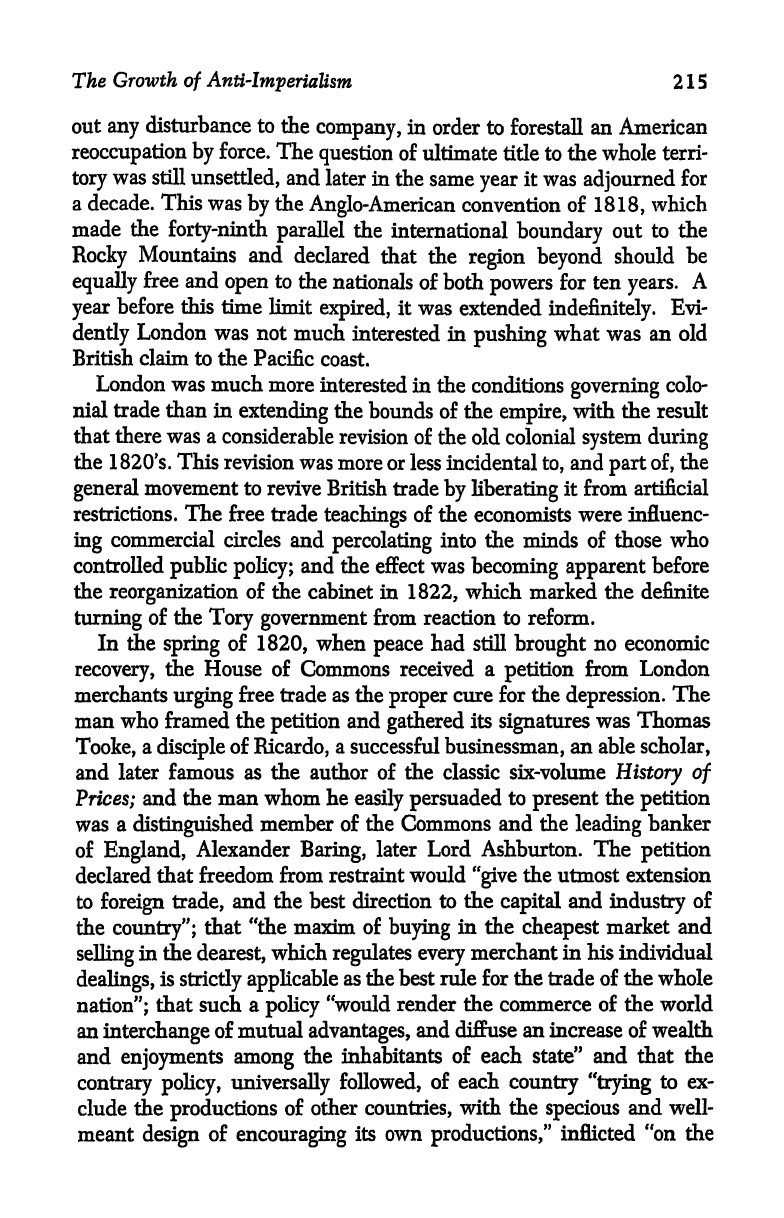
The
Growth
of
Anti-Imperialism
215
out
any
disturbance to
the
company,
in
order
to forestall
an American
reoccupation
by
force.
The
question
of ultimate title
to
the whole
terri-
tory
was
still
unsettled,
and
later
in
the same
year
it was
adjourned
for
a
decade.
This
was
by
the
Anglo-American
convention of
1818,
which
made
the
forty-ninth
parallel
the
international
boundary
out
to
the
Rocky
Mountains and
declared
that the
region
beyond
should
be
equally
free
and
open
to
the
nationals
of both
powers
for
ten
years.
A
year
before this time
limit
expired,
it
was
extended
indefinitely.
Evi-
dently
London was
not
much
interested
in
pushing
what
was an old
British
claim
to
the
Pacific
coast.
London was
much more
interested
in the conditions
governing
colo-
nial
trade
than
in
extending
the
bounds of
the
empire,
with
the result
that
there
was a
considerable
revision
of the old colonial
system
during
the 1820's. This
revision
was more or
less incidental
to,
and
part
of,
the
general
movement to
revive British
trade
by
liberating
it
from
artificial
restrictions.
The
free
trade
teachings
of
the
economists
were
influenc-
ing
commercial
circles
and
percolating
into the
minds
of
those
who
controlled
public policy;
and
the
effect was
becoming apparent
before
the
reorganization
of
the cabinet
in
1822,
which marked the
definite
turning
of
the
Tory
government
from
reaction to reform.
In the
spring
of
1820,
when
peace
had still
brought
no economic
recovery,
the
House
of Commons received
a
petition
from
London
merchants
urging
free trade
as the
proper
cure
for
the
depression.
The
man who framed the
petition
and
gathered
its
signatures
was Thomas
Tooke,
a
disciple
of
Ricardo,
a
successful
businessman,
an able
scholar,
and later
famous as the author of the classic six-volume
History
of
Prices;
and
the man whom he
easily persuaded
to
present
the
petition
was
a
distinguished
member of
the Commons and the
leading
banker
of
England,
Alexander
Baring,
later
Lord
Ashburton.
The
petition
declared
that freedom
from restraint
would
"give
the utmost
extension
to
foreign
trade,
and the best direction
to
the
capital
and
industry
of
the
country";
that
"the
maxim
of
buying
in
the
cheapest
market and
selling
in
the
dearest,
which
regulates
every
merchant
in
his
individual
dealings,
is
strictly
applicable
as the best rule for
the
trade of
the
whole
nation";
that such
a
policy
"would
render the
commerce
of the
world
an
interchange
of
mutual
advantages,
and
diffuse an increase
of wealth
and
enjoyments among
the inhabitants
of
each
state" and that the
contrary policy,
universally
followed,
of
each
country "trying
to
ex-
clude the
productions
of
other
countries,
with
the
specious
and well-
meant
design
of
encouraging
its own
productions,"
inflicted "on
the
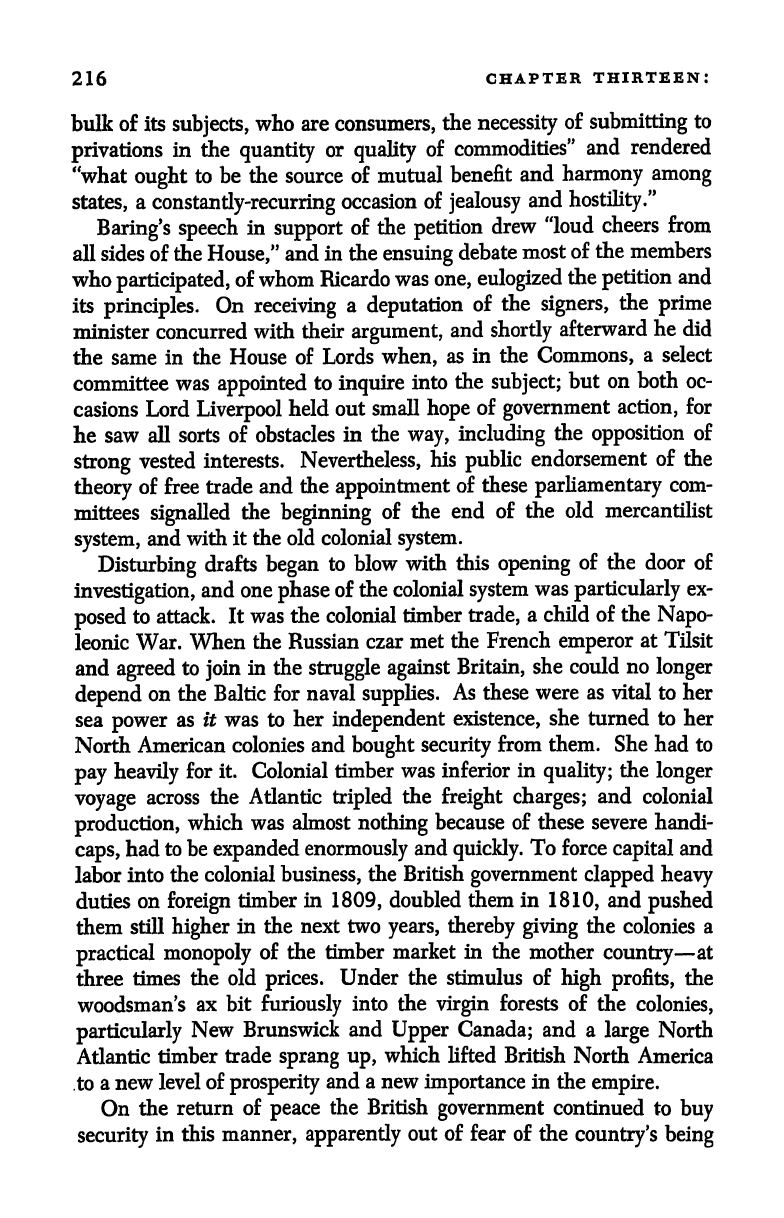
216
CHAPTER
THIRTEEN:
bulk of its
subjects,
who
are
consumers,
the
necessity
of
submitting
to
privations
in
the
quantity
or
quality
of
commodities"
and
rendered
"what
ought
to be
the
source of
mutual
benefit
and
harmony
among
states,
a
constantly-recurring
occasion
of
jealousy
and
hostility,"
Baring's
speech
in
support
of
the
petition
drew
"loud
cheers from
all sides of
the
House,"
and in the
ensuing
debate
most
of
the
members
who
participated,
of
whom
Ricardo
was
one,
eulogized
the
petition
and
its
principles.
On
receiving
a
deputation
of
the
signers,
the
prime
minister concurred
with
their
argument,
and
shortly
afterward
he
did
the same
in the House
of Lords
when,
as
in the
Commons,
a
select
committee
was
appointed
to
inquire
into
the
subject;
but
on both oc-
casions Lord
Liverpool
held
out
small
hope
of
government
action,
for
he
saw all
sorts
of obstacles
in
the
way,
including
the
opposition
of
strong
vested
interests.
Nevertheless,
his
public
endorsement
of
the
theory
of free
trade
and the
appointment
of
these
parliamentary
com-
mittees
signalled
the
beginning
of
the
end of
the
old mercantilist
system,
and
with
it
the old colonial
system.
Disturbing
drafts
began
to
blow
with
this
opening
of the door
of
investigation,
and
one
phase
of
the colonial
system
was
particularly
ex-
posed
to
attack.
It
was
the colonial
timber
trade,
a
child
of the
Napo-
leonic
War. When
the Russian
czar
met
the
French
emperor
at
Tilsit
and
agreed
to
join
in
the
struggle against
Britain,
she
could no
longer
depend
on
the Baltic for
naval
supplies.
As
these
were as
vital to her
sea
power
as
it
was to
her
independent
existence,
she turned to her
North
American colonies
and
bought
security
from
them.
She
had
to
pay
heavily
for
it. Colonial
timber was
inferior in
quality;
the
longer
voyage
across
the
Atlantic
tripled
the
freight
charges;
and colonial
production,
which
was almost
nothing
because
of these severe
handi-
caps,
had
to
be
expanded
enormously
and
quickly.
To force
capital
and
labor
into the
colonial
business,
the British
government clapped
heavy
duties
on
foreign
timber
in
1809,
doubled
them in
1810,
and
pushed
them
still
higher
in the
next
two
years,
thereby
giving
the
colonies
a
practical
monopoly
of
the timber
market in the
mother
country
at
three
times
the old
prices.
Under the stimulus of
high profits,
the
woodsman's
ax bit
furiously
into
the
virgin
forests
of the
colonies,
particularly
New
Brunswick and
Upper
Canada;
and
a
large
North
Atlantic
timber
trade
sprang
up,
which lifted British
North
America
to
a new
level
of
prosperity
and
a
new
importance
in
the
empire.
On
the
return of
peace
the
British
government
continued
to
buy
security
in
this
manner,
apparently
out of fear
of the
country's
being
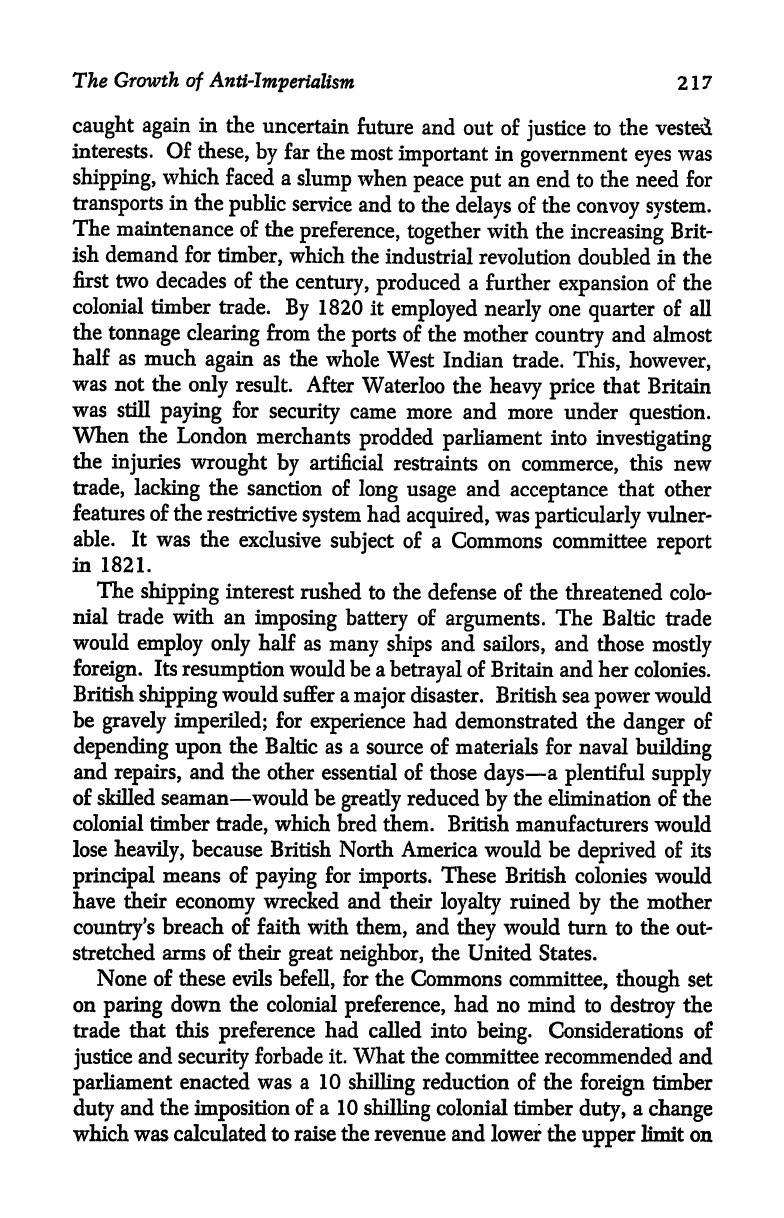
The
Growth
of
Anti-Imperialism
217
caught again
in
the
uncertain
future
and
out of
justice
to the
vested
interests. Of
these,
by
far
the
most
important
in
government
eyes
was
shipping,
which
faced a
slump
when
peace put
an
end
to
the need for
transports
in
the
public
service
and to the
delays
of the
convoy system.
The
maintenance
of
the
preference,
together
with the
increasing
Brit-
ish demand for
timber,
which
the
industrial
revolution doubled
in the
first
two
decades of the
century, produced
a further
expansion
of the
colonial timber
trade.
By
1820
it
employed
nearly
one
quarter
of
all
the
tonnage
clearing
from
the
ports
of the
mother
country
and
almost
half
as
much
again
as
the
whole
West
Indian trade.
This,
however,
was not
the
only
result.
After
Waterloo
the
heavy
price
that
Britain
was still
paying
for
security
came
more and more under
question.
When the
London
merchants
prodded
parliament
into
investigating
the
injuries
wrought
by
artificial restraints
on
commerce,
this
new
trade,
lacking
the
sanction
of
long
usage
and
acceptance
that
other
features
of the
restrictive
system
had
acquired,
was
particularly
vulner-
able. It
was
the
exclusive
subject
of a
Commons committee
report
in
1821.
The
shipping
interest
rushed to the
defense of the
threatened colo-
nial
trade
with
an
imposing battery
of
arguments.
The
Baltic trade
would
employ only
half
as
many
ships
and
sailors,
and those
mostly
foreign.
Its
resumption
would
be a
betrayal
of
Britain and her
colonies.
British
shipping
would suffer a
major
disaster. British
sea
power
would
be
gravely imperiled;
for
experience
had
demonstrated the
danger
of
depending
upon
the
Baltic as
a
source
of materials for naval
building
and
repairs,
and
the
other
essential of
those
days
a
plentiful
supply
of skilled seaman
would be
greatly
reduced
by
the elimination
of
the
colonial timber
trade,
which bred them. British
manufacturers
would
lose
heavily,
because
British North America
would be
deprived
of
its
principal
means of
paying
for
imports.
These British
colonies would
have
their
economy
wrecked and
their
loyalty
ruined
by
the
mother
country's
breach of faith with
them,
and
they
would
turn
to
the
out-
stretched arms of their
great
neighbor,
the
United States.
None of
these
evils
befell,
for
the
Commons
committee,
though
set
on
paring
down
the
colonial
preference,
had
no mind to
destroy
the
trade
that
this
preference
had
called into
being.
Considerations
of
justice
and
security
forbade it. What the
committee
recommended and
parliament
enacted was a 10
shilling
reduction of the
foreign
timber
duty
and
the
imposition
of
a
10
shilling
colonial timber
duty,
a
change
which was calculated to
raise the
revenue
and lower
the
upper
limit
on
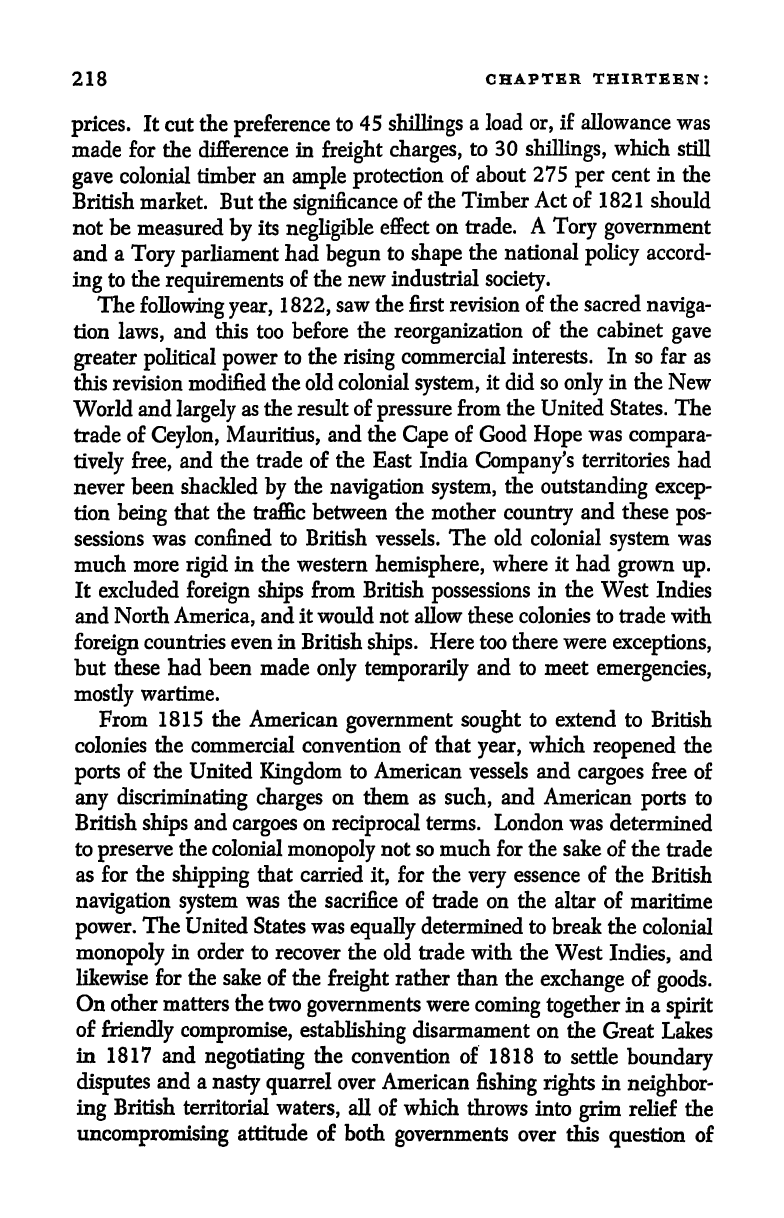
218
CHAPTER THIRTEEN:
prices.
It cut
the
preference
to
45
shillings
a load
or,
if
allowance was
made for
the
difference in
freight
charges,
to 30
shillings,
which
still
gave
colonial timber an
ample
protection
of
about
275
per
cent in
the
British
market.
But the
significance
of
the
Timber
Act
of 1821
should
not
be
measured
by
its
negligible
effect
on trade.
A
Tory
government
and
a
Tory
parliament
had
begun
to
shape
the national
policy
accord-
ing
to
the
requirements
of
the
new
industrial
society.
The
following
year,
1
822,
saw the
first revision of
the sacred
naviga-
tion
laws,
and
this
too
before
the
reorganization
of
the cabinet
gave
greater political power
to
the
rising
commercial
interests. In
so
far as
this
revision
modified
the
old colonial
system,
it
did
so
only
in the
New
World and
largely
as the
result of
pressure
from
the
United
States.
The
trade
of
Ceylon,
Mauritius,
and the
Cape
of
Good
Hope
was
compara-
tively
free,
and the trade
of the East India
Company's
territories
had
never been shackled
by
the
navigation
system,
the
outstanding
excep-
tion
being
that
the traffic between the
mother
country
and these
pos-
sessions
was confined
to
British vessels.
The old colonial
system
was
much
more
rigid
in
the
western
hemisphere,
where it had
grown
up.
It
excluded
foreign
ships
from British
possessions
in the West
Indies
and
North
America,
and it would not allow these colonies
to
trade with
foreign
countries even in
British
ships.
Here
too
there were
exceptions,
but
these
had
been
made
only temporarily
and
to meet
emergencies,
mostly
wartime.
From
1815 the American
government sought
to extend
to
British
colonies
the
commercial convention
of that
year,
which
reopened
the
ports
of
the
United
Kingdom
to
American vessels
and
cargoes
free
of
any
discriminating charges
on them as
such,
and American
ports
to
British
ships
and
cargoes
on
reciprocal
terms. London
was
determined
to
preserve
the
colonial
monopoly
not
so much for the sake
of
the
trade
as for
the
shipping
that
carried
it,
for the
very
essence of the
British
navigation
system
was
the
sacrifice
of
trade
on the altar of
maritime
power.
The
United States
was
equally
determined to break
the
colonial
monopoly
in order
to
recover the old trade with the
West
Indies,
and
likewise
for
the
sake of the
freight
rather
than the
exchange
of
goods.
On
other
matters the two
governments
were
coming together
in a
spirit
of
friendly
compromise,
establishing
disarmament
on the
Great
Lakes
in
1817
and
negotiating
the
convention
of 1818
to
settle
boundary
disputes
and
a
nasty
quarrel
over American
fishing rights
in
neighbor-
ing
British territorial
waters,
all of which
throws into
grim
relief the
uncompromising
attitude of
both
governments
over
this
question
of
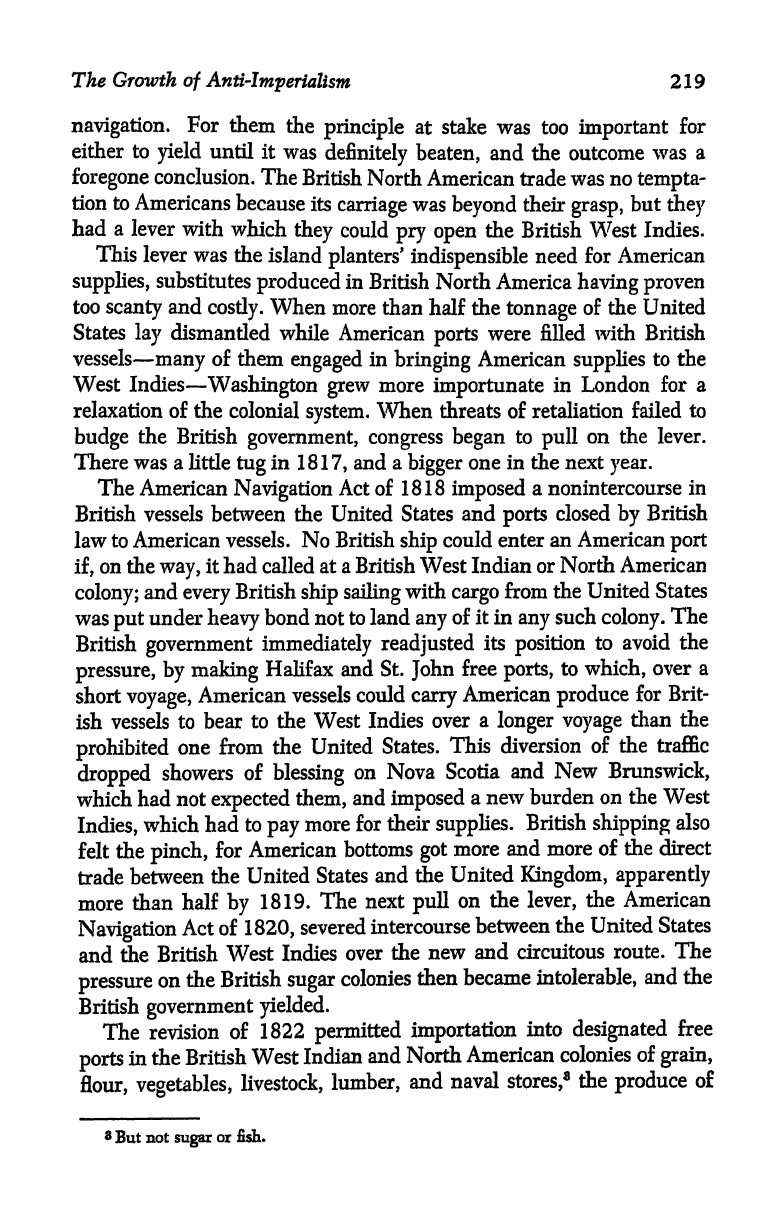
The
Growth
of
Anti-Imperialism
219
navigation.
For
them
the
principle
at
stake
was too
important
for
either to
yield
until it
was
definitely
beaten,
and
the outcome
was
a
foregone
conclusion.
The
British
North
American
trade
was
no
tempta-
tion to Americans
because
its
carriage
was
beyond
their
grasp,
but
they
had
a
lever
with
which
they
could
pry open
the British
West
Indies.
This
lever
was the
island
planters'
indispensible
need
for
American
supplies,
substitutes
produced
in
British
North America
having
proven
too
scanty
and
costly.
When
more
than half the
tonnage
of
the United
States
lay
dismantled
while American
ports
were filled
with
British
vessels
many
of them
engaged
in
bringing
American
supplies
to the
West
Indies
Washington grew
more
importunate
in London
for a
relaxation
of the
colonial
system.
When threats of retaliation
failed
to
budge
the British
government,
congress
began
to
pull
on the lever.
There
was
a little
tug
in
1817,
and
a
bigger
one
in
the
next
year.
The American
Navigation
Act
of
1818
imposed
a nonintercourse
in
British vessels between the
United States
and
ports
closed
by
British
law
to
American vessels. No
British
ship
could
enter
an American
port
if,
on the
way,
it
had called at a British
West
Indian
or
North
American
colony;
and
every
British
ship sailing
with
cargo
from
the
United States
was
put
under
heavy
bond
not
to land
any
of
it in
any
such
colony.
The
British
government
immediately readjusted
its
position
to avoid
the
pressure,
by
making
Halifax and St.
John
free
ports,
to
which,
over
a
short
voyage,
American vessels
could
carry
American
produce
for
Brit-
ish
vessels
to
bear
to the West
Indies
over
a
longer
voyage
than
the
prohibited
one
from the United
States.
This
diversion
of
the
traffic
dropped
showers
of
blessing
on
Nova Scotia
and New
Brunswick,
which
had not
expected
them,
and
imposed
a
new burden
on the West
Indies,
which
had
to
pay
more
for
their
supplies.
British
shipping
also
felt
the
pinch,
for
American
bottoms
got
more
and more
of
the direct
trade
between
the
United
States and
the
United
Kingdom,
apparently
more
than
half
by
1819.
The
next
pull
on
the
lever,
the American
Navigation
Act of
1820,
severed
intercourse
between
the United
States
and
the
British
West
Indies
over
the
new
and
circuitous
route.
The
pressure
on
the
British
sugar
colonies
then became
intolerable,
and
the
British
government
yielded.
The
revision
of
1822
permitted
importation
into
designated
free
ports
in
the
British
West
Indian
and
North
American
colonies
of
grain,
flour,
vegetables,
livestock,
lumber,
and
naval
stores,
3
the
produce
of
3
But
not
sugar
or
fish.
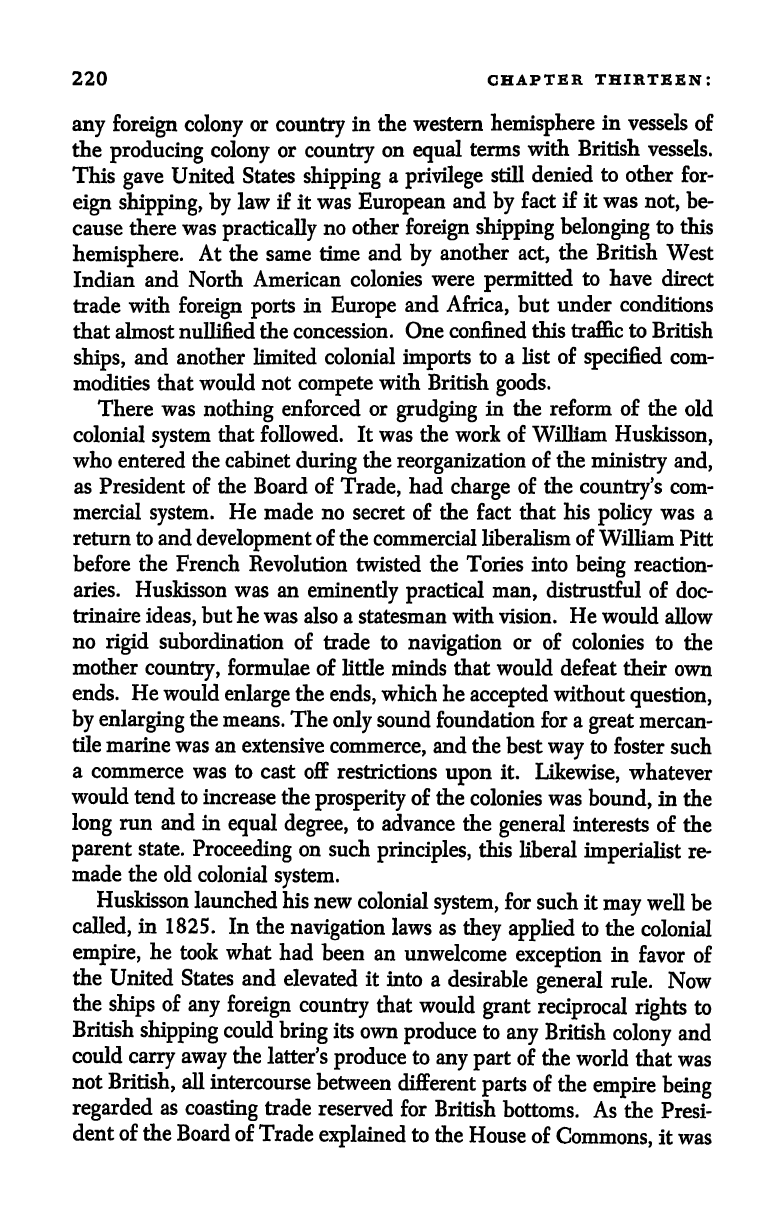
220
CHAPTER
THIRTEEN:
any
foreign
colony
or
country
in
the western
hemisphere
in
vessels
of
the
producing
colony
or
country
on
equal
terms
with British
vessels.
This
gave
United
States
shipping
a
privilege
still
denied
to
other
for-
eign
shipping,
by
law if
it
was
European
and
by
fact
if
it
was
not,
be-
cause there
was
practically
no
other
foreign shipping
belonging
to
this
hemisphere.
At
the same
time
and
by
another
act,
the British
West
Indian and
North American
colonies
were
permitted
to have
direct
trade
with
foreign
ports
in
Europe
and
Africa,
but
under
conditions
that
almost
nullified
the
concession. One confined
this traffic to
British
ships,
and another limited
colonial
imports
to a list
of
specified
com-
modities that
would not
compete
with British
goods.
There was
nothing
enforced
or
grudging
in the
reform of the
old
colonial
system
that
followed.
It
was
the work
of William
Huskisson,
who entered
the cabinet
during
the
reorganization
of the
ministry
and,
as President of
the
Board of
Trade,
had
charge
of
the
country's
com-
mercial
system.
He
made no secret of the fact
that his
policy
was
a
return
to and
development
of the
commercial liberalism
of
William
Pitt
before
the
French
Revolution
twisted the Tories
into
being
reaction-
aries.
Huskisson
was
an
eminently practical
man,
distrustful of
doc-
trinaire
ideas,
but he
was
also a statesman
with
vision.
He
would allow
no
rigid
subordination
of
trade
to
navigation
or
of
colonies to
the
mother
country,
formulae of little minds that would
defeat their
own
ends.
He
would
enlarge
the
ends,
which he
accepted
without
question,
by
enlarging
the
means.
The
only
sound foundation for a
great
mercan-
tile marine
was an
extensive
commerce,
and the best
way
to foster
such
a
commerce
was to cast
off
restrictions
upon
it.
Likewise,
whatever
would
tend to
increase the
prosperity
of the
colonies was
bound,
in
the
long
run
and in
equal
degree,
to advance the
general
interests
of
the
parent
state.
Proceeding
on such
principles,
this liberal
imperialist
re-
made
the
old
colonial
system.
Huskisson
launched his new
colonial
system,
for
such
it
may
well
be
called,
in
1825.
In
the
navigation
laws as
they
applied
to
the
colonial
empire,
he
took
what
had been
an
unwelcome
exception
in
favor of
the
United States
and
elevated it into
a
desirable
general
rule.
Now
the
ships
of
any
foreign
country
that
would
grant
reciprocal
rights
to
British
shipping
could
bring
its own
produce
to
any
British
colony
and
could
carry
away
the
latter's
produce
to
any part
of the
world
that
was
not
British,
all
intercourse
between
different
parts
of
the
empire
being
regarded
as
coasting
trade
reserved for
British
bottoms.
As the
Presi-
dent of
the
Board
of
Trade
explained
to
the
House
of
Commons,
it was
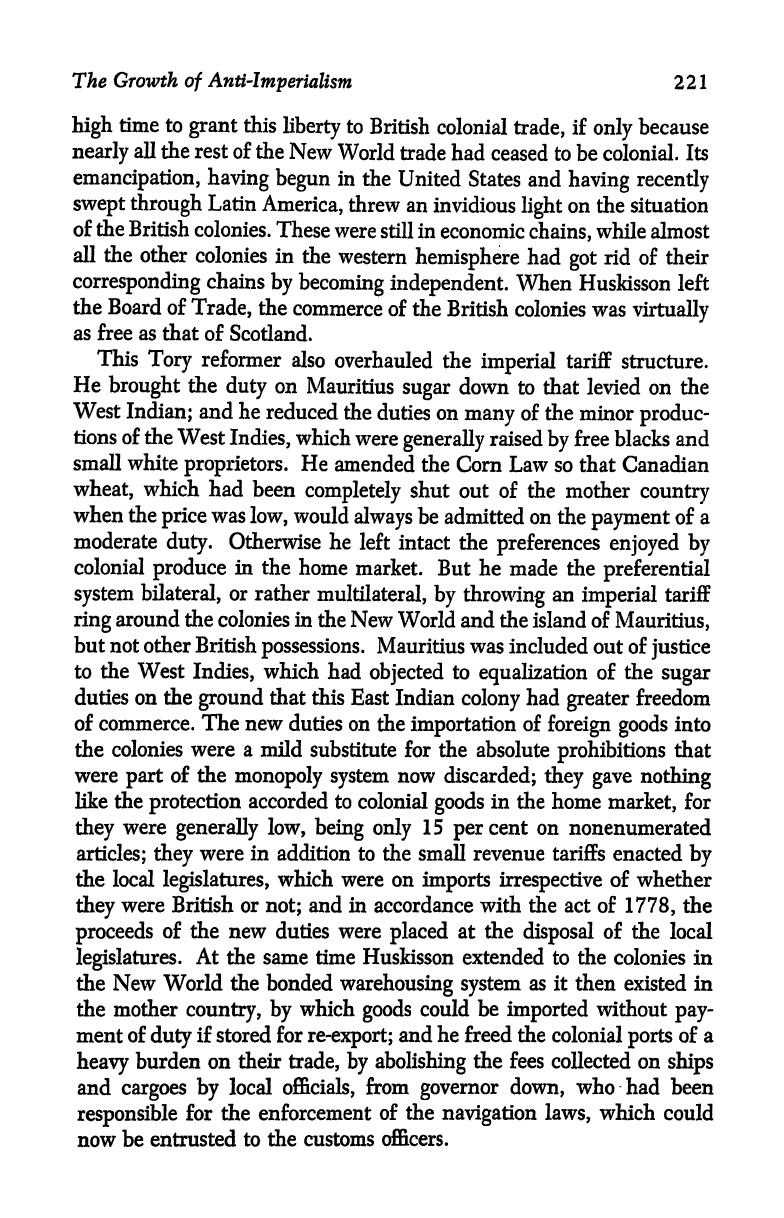
The
Growth
of
Anti-Imperialism
2 2
1
high
time
to
grant
this
liberty
to
British
colonial
trade,
if
only
because
nearly
all
the
rest
of the
New
World
trade had
ceased to be colonial.
Its
emancipation,
having
begun
in
the
United
States
and
having
recently
swept
through
Latin
America,
threw
an
invidious
light
on the
situation
of
the
British
colonies.
These
were still
in
economic
chains,
while
almost
all the
other
colonies
in
the
western
hemisphere
had
got
rid of
their
corresponding
chains
by
becoming
independent.
When
Huskisson
left
the
Board
of
Trade,
the
commerce of the
British colonies was
virtually
as free
as that
of
Scotland.
This
Tory
reformer
also
overhauled the
imperial
tariff
structure.
He
brought
the
duty
on
Mauritius
sugar
down to that
levied on
the
West
Indian;
and he
reduced the
duties
on
many
of
the
minor
produc-
tions
of the
West
Indies,
which were
generally
raised
by
free blacks and
small
white
proprietors.
He
amended the
Corn
Law so that
Canadian
wheat,
which
had
been
completely
shut
out
of
the mother
country
when the
price
was
low,
would
always
be
admitted
on
the
payment
of a
moderate
duty.
Otherwise
he
left
intact
the
preferences enjoyed by
colonial
produce
in
the
home
market.
But he made the
preferential
system
bilateral,
or
rather
multilateral,
by
throwing
an
imperial
tariff
ring
around the
colonies
in
the New
World and the
island of
Mauritius,
but not
other British
possessions.
Mauritius was included
out of
justice
to
the
West
Indies,
which
had
objected
to
equalization
of
the
sugar
duties on the
ground
that this
East
Indian
colony
had
greater
freedom
of commerce. The new
duties
on
the
importation
of
foreign
goods
into
the
colonies
were a
mild substitute
for
the
absolute
prohibitions
that
were
part
of the
monopoly system
now
discarded;
they
gave
nothing
like the
protection
accorded
to
colonial
goods
in the home
market,
for
they
were
generally
low,
being only
15
percent
on
nonenumerated
articles;
they
were in
addition
to
the
small
revenue
tariffs
enacted
by
the local
legislatures,
which were on
imports
irrespective
of whether
they
were British
or
not;
and in accordance with the act
of
1778,
the
proceeds
of
the
new
duties
were
placed
at
the
disposal
of
the
local
legislatures.
At
the same
time
Huskisson extended
to
the
colonies in
the
New
World
the
bonded
warehousing
system
as it then
existed in
the mother
country,
by
which
goods
could be
imported
without
pay-
ment
of
duty
if stored for
re-export;
and
he freed the
colonial
ports
of
a
heavy
burden on
their
trade,
by abolishing
the fees
collected
on
ships
and
cargoes by
local
officials,
from
governor
down,
who had been
responsible
for
the enforcement
of the
navigation
laws,
which
could
now
be
entrusted to
the customs
officers.
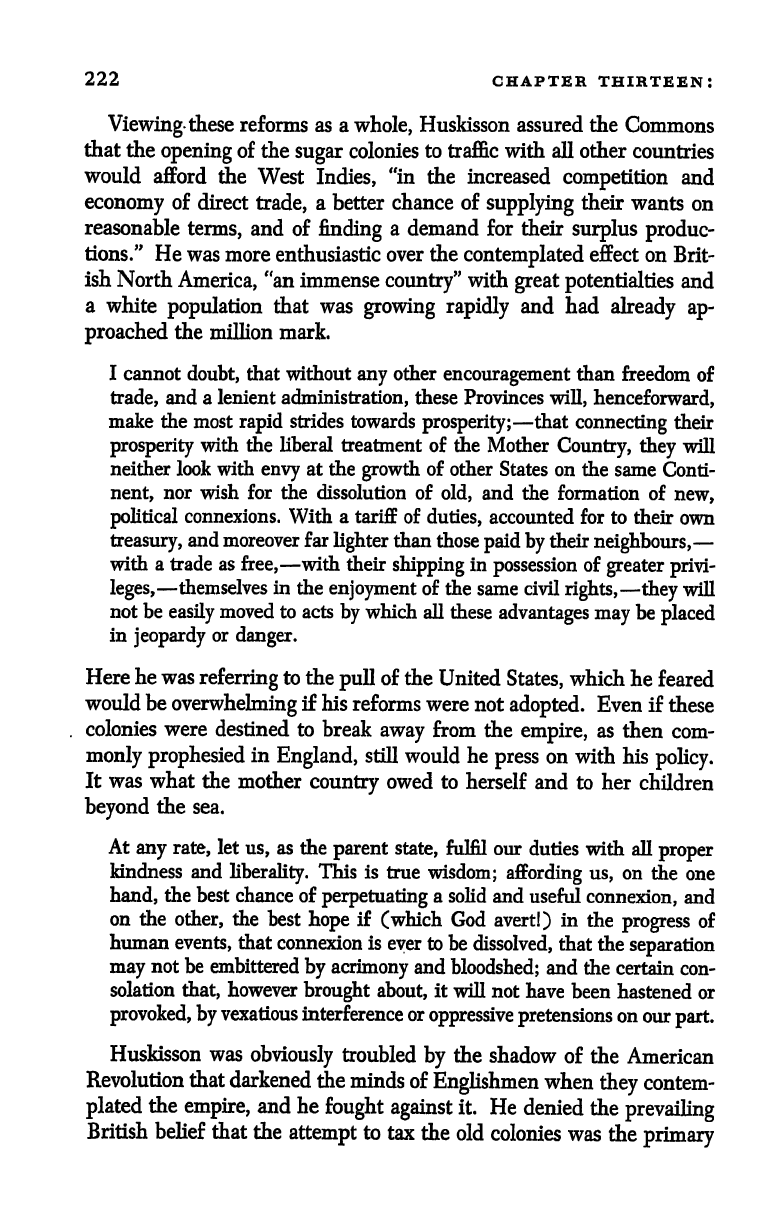
222
CHAPTER
THIRTEEN:
Viewing
these
reforms as a
whole,
Huskisson assured the
Commons
that
the
opening
of
the
sugar
colonies
to traffic with
all
other
countries
would
afford the
West
Indies,
"in
the increased
competition
and
economy
of direct
trade,
a
better
chance of
supplying
their
wants
on
reasonable
terms,
and
of
finding
a demand for their
surplus
produc-
tions."
He
was
more enthusiastic
over
the
contemplated
effect
on
Brit-
ish
North
America,
"an immense
country"
with
great
potentialties
and
a
white
population
that was
growing rapidly
and
had
already
ap-
proached
the
million mark.
I
cannot
doubt,
that without
any
other
encouragement
than
freedom
of
trade,
and
a lenient
administration,
these Provinces
will,
henceforward,
make the most
rapid
strides towards
prosperity;
that
connecting
their
prosperity
with the
liberal
treatment of die
Mother
Country,
they
will
neither
look with
envy
at
the
growth
of other
States on
the
same
Conti-
nent,
nor
wish
for the
dissolution of
old,
and
the formation
of
new,
political
connexions.
With
a
tariff
of
duties,
accounted
for to
their
own
treasury,
and moreover
far
lighter
than
those
paid
by
their
neighbours,
with
a
trade
as
free,
with their
shipping
in
possession
of
greater
privi-
leges,
themselves in
the
enjoyment
of
the same civil
rights,
they
will
not
be
easily
moved to acts
by
which
all
these
advantages
may
be
placed
in
jeopardy
or
danger.
Here he
was
referring
to the
pull
of
the United
States,
which
he
feared
would be
overwhelming
if
his
reforms were
not
adopted.
Even
if
these
colonies were
destined to
break
away
from the
empire,
as
then
com-
monly
prophesied
in
England,
still
would
he
press
on with his
policy.
It
was
what
the mother
country
owed to
herself
and to her
children
beyond
the
sea.
At
any
rate,
let
us,
as the
parent
state,
fulfil our
duties with
all
proper
kindness and
liberality.
This
is
true
wisdom;
affording
us,
on
the
one
hand,
the best
chance of
perpetuating
a
solid
and useful
connexion,
and
on the
other,
the best
hope
if
(which
God
avert!)
in
the
progress
of
human
events,
that
connexion is
ever to be
dissolved,
that the
separation
may
not be
embittered
by
acrimony
and
bloodshed;
and the
certain con-
solation
that,
however
brought
about,
it
will
not
have
been
hastened
or
provoked, by
vexatious
interference
or
oppressive
pretensions
on our
part.
Huskisson was
obviously
troubled
by
the
shadow
of
the
American
Revolution
that
darkened
the minds of
Englishmen
when
they
contem-
plated
the
empire,
and he
fought
against
it. He
denied
the
prevailing
British
belief
that
the
attempt
to tax
the old
colonies
was
the
primary

The
Growth
of
Anti-Imperialism
223
cause
of
their
revolt.
The
train
of
that
explosion,
he
insisted,
"had
long
been
laid,
in
the
severe
and
exasperating
efforts
of
this
country,
to
enforce,
with
inopportune
and
increasing
vigour,
the
strictest
and
most
annoying regulations
of our
Colonial
and
Navigation
Code."
His
in-
terpretation,
shared
by
contemporary
economists,
became that
of
the
whole
free
trade
school
which
regarded
the
colonies
as millstones
round the
neck
of
the
mother
country,
and
of
Americans
who
looked
back
and
saw
the
mother
country
as
a
millstone round the
neck of
the
colonies.
Whether
he
was
right
or
wrong
in this
reading
of
the
past,
which is
a
debatable
question,
his
reforms
undoubtedly
guarded
the
future
against
the
possibility
of
another British
colonial
revolt
inspired
by
such
imperial
restrictions.
Though
British
faith
in
the
value
and
the
survival
of
the
empire
continued to sink
under
the
pressure
of
the
industrial
society
that
was
rising
in
the
mother
country,
a
mass
movement had
already
started
that
was
to
regenerate
the
empire.
It was the
outpouring
of the
surplus
population
of
the
British Isles
to
find
a
larger
life
in
British lands
beyond
the
sea.
It
contributed
enormously
to
the
development
of the
colonies and to the
human ties that
bound
them
to
the mother
country.
But
this
strengthening
of
the
empire
was
the unconscious
result
rather
than the
conscious
purpose
of
the
movement,
and
it was
not
until the
last
quarter
of the
nineteenth
century
that the
people
of Britain
dis-
covered
that
the
empire
was not on
the
road to
disintegration.
Mean-
while,
so
strong
was the
influence
of
the
American
Revolution,
they
took for
granted
that
the colonies would
break
away
as
soon
as
they
were
able
to stand
by
themselves.
The mass
migration
from
the
British Isles to
the British colonies
in
the
nineteenth
century,
which transformed the
empire,
dwarfs
into
relative
insignificance
the
contribution of
population
made
by
any
other
European power
to its colonies. The nearest
parallel,
which is on
a much
smaller
scale,
is
that of
England
in the
seventeenth
century,
when
more
Englishmen
settled
overseas than did
the
combined total
of
Spaniards,
Portuguese,
French,
and
Dutch. Then
England
ceased
to
be
a
colonizing
country
for several
generations. During
the
eighteenth
century,
when
English emigration
was little
more than
a
trickle,
the
Scottish
Highlands
and Northern
Ireland
began
to send forth
emigrants
in
considerable
numbers.
It
has
been calculated
that
they
were
moving
to
the
colonies
at the rate
of
20,000
a
year
before
the
outbreak of
the
American
Revolutionary
War. When
that
war
was over this
migration
was
resumed,
apparently
at
a
reduced rate. Some
Highlanders
then
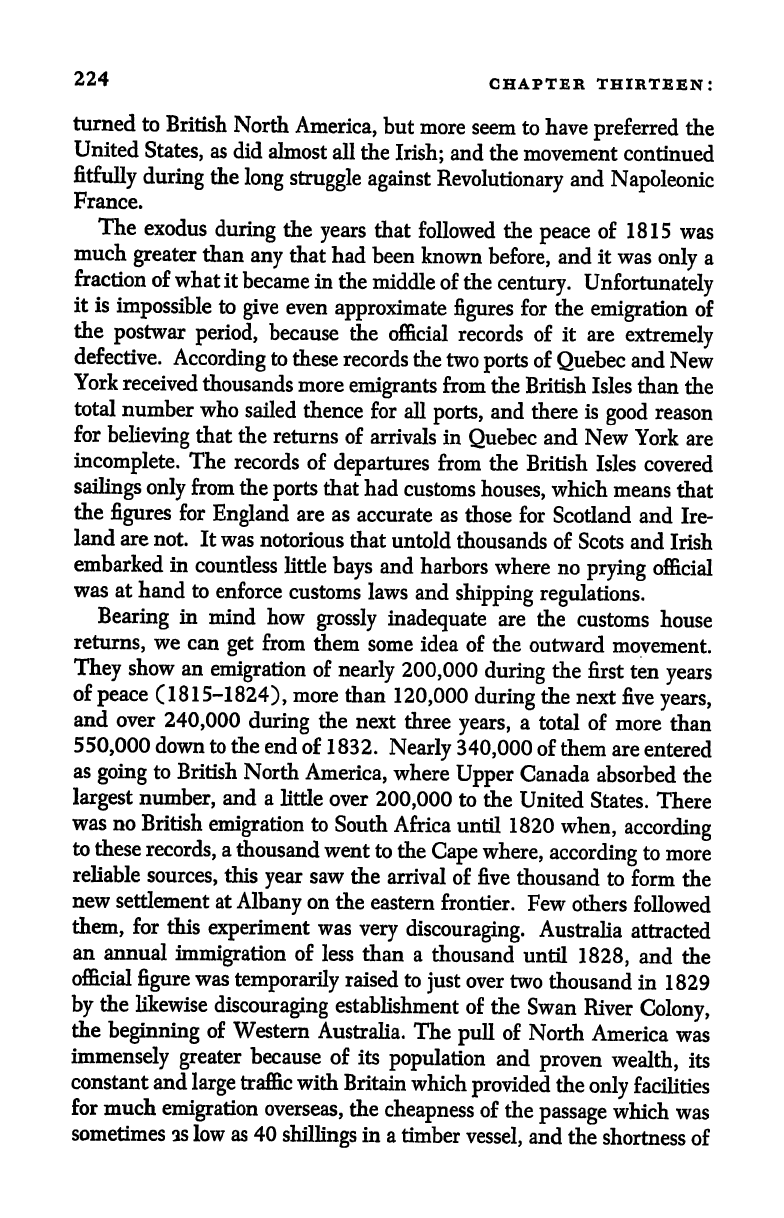
224
CHAPTER
THIRTEEN:
turned
to
British
North
America,
but
more
seem
to
have
preferred
the
United
States,
as
did
almost
all
the
Irish;
and the
movement
continued
fitfully
during
the
long
struggle
against
Revolutionary
and
Napoleonic
France.
The
exodus
during
the
years
that
followed
the
peace
of 1815
was
much
greater
than
any
that
had been
known
before,
and
it
was
only
a
fraction of
what
it
became in
the
middle of the
century.
Unfortunately
it
is
impossible
to
give
even
approximate
figures
for the
emigration
of
the
postwar
period,
because
the
official
records of it
are
extremely
defective.
According
to
these
records
the
two
ports
of
Quebec
and
New
York
received
thousands
more
emigrants
from
the British Isles
than
the
total
number
who
sailed
thence
for
all
ports,
and
there
is
good
reason
for
believing
that
the returns
of
arrivals
in
Quebec
and
New
York
are
incomplete.
The
records of
departures
from
the
British
Isles
covered
sailings
only
from
the
ports
that
had
customs
houses,
which
means
that
the
figures
for
England
are
as
accurate
as
those
for Scotland
and
Ire-
land
are
not.
It
was
notorious that
untold
thousands
of Scots
and
Irish
embarked in
countless
little
bays
and
harbors
where
no
prying
official
was at
hand to
enforce
customs laws
and
shipping
regulations.
Bearing
in
mind
how
grossly
inadequate
are
the
customs
house
returns,
we
can
get
from
them
some
idea
of
the
outward
movement.
They
show
an
emigration
of
nearly
200,000
during
the
first ten
years
of
peace
(1815-1824),
more than
120,000
during
the
next
five
years,
and over
240,000
during
the
next
three
years,
a
total of
more
than
550,000
down to the
end
of 1
832.
Nearly
340,000
of
them
are
entered
as
going
to British
North
America,
where
Upper
Canada
absorbed
the
largest
number,
and a
little
over
200,000
to
the
United
States.
There
was
no
British
emigration
to
South
Africa
until
1820
when,
according
to these
records,
a
thousand
went
to the
Cape
where,
according
to
more
reliable
sources,
this
year
saw
the
arrival
of
five
thousand to
form
the
new
settlement
at
Albany
on
the
eastern
frontier.
Few
others
followed
them,
for
this
experiment
was
very
discouraging.
Australia
attracted
an
annual
immigration
of
less than
a
thousand
until
1828,
and the
official
figure
was
temporarily
raised to
just
over
two
thousand in
1829
by
the
likewise
discouraging
establishment of
the
Swan
River
Colony,
the
beginning
of Western
Australia.
The
pull
of
North
America
was
immensely
greater
because of
its
population
and
proven
wealth,
its
constant and
large
traffic
with
Britain
which
provided
the
only
facilities
for
much
emigration
overseas,
the
cheapness
of
the
passage
which
was
sometimes
as low
as 40
shillings
in
a
timber
vessel,
and the
shortness of
